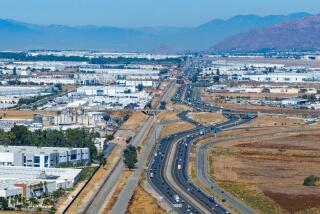Residents Debate Tax Destined for Developer : Newbury Park: Thousand Oaks officials ask residents to respond to an unusual assessment proposal. Reactions are extreme.
- Share via
Angry, excited and above all skeptical, more than 150 Newbury Park residents packed a town meeting Wednesday night to debate an unusual proposal that would raise taxes to pay a developer for scrapping a planned shopping mall.
The proposal calls for citizens, the city of Thousand Oaks and the county Flood Control District to compensate developer Albert Cohen if he agrees to abandon plans for a supermarket and strip mall on his property.
By a show of hands, slightly more than half the residents said they wanted the City Council to consider the proposal, but by and large their support was grudging.
“We’ve been asked to compensate the Cohens for their supposed loss of revenue, yet I didn’t see anything in his original proposal to compensate the homeowners for our admitted loss of property value,” said Steve Grossman, a three-year Newbury Park resident.
Property owners living within roughly three-quarters of a mile of Cohen’s lot, on the southwest corner of Kimber Drive and Reino Road, would pay $45 to $135 a year to a new benefit assessment district that would generate $2 million over several decades, said David Armanetti, a consultant who drafted the proposal.
The city would use those funds to purchase 14 acres of wetlands and riparian habitat, some of which Cohen had dreamed of turning into a commercial center. In addition, Thousand Oaks would chip in several acres of city-owned land contiguous to the Cohen property, which Cohen would be free to develop with residential units.
Reaction to the proposal swung between two extremes: joy that a shopping center could be averted and dismay that neighbors would have to foot the bill.
The audience reacted most enthusiastically when residents denounced the proposed tax. Some snorted in disbelief when Armanetti insisted, “This is not a payoff.”
“Is the city so much in the pocket of developers that it has to pay them off?” local activist Michelle Koetke asked before the meeting. “Why should an individual pay a tax over decades to prevent development that never should take place anyway? It seems nuts to me.”
Details of the assessment district--including who would pay how much and for how long--remain vague. But several longtime residents said that they would be willing to put up a small sum to keep part of the property a grassy, park-like field.
“If you can get groups of people together to protect the neighborhood, and if they can divide up the cost so it’s not a tremendous financial burden, I think that’s a wonderful idea,” said Carrie Mahan, a 13-year Newbury Park resident who now lives just a few blocks from the disputed parcel.
Voicing a common view, resident Marc Josephson added, “I don’t like new taxes, but if it were a small rate that would be guaranteed not to increase over the years, I’d agree. The idea sounds pretty good to me.”
Cohen also cautiously praised the proposal, indicating he would give up his shopping mall if he received substantial compensation. The rest of his property would be carved up into mid- to large-sized lots for about 150 single-family homes.
In rowdy public hearings throughout the past decade, Newbury Park activists have lobbied hard to keep development off the environmentally sensitive Cohen property, which serves as a natural flood protection basin that collects water during storms.
Residents have protested Cohen’s plans to build another shopping center in their neighborhood, a pocket of quiet residential streets that slams up against industrial parks and strip malls.
Their biggest gripe, expressed repeatedly Wednesday, remains the city’s decision to zone 12 acres of the land for commercial use.
Because Cohen has filed a lawsuit against the City Council for rejecting his original development proposal in July, the council’s hands are tied on the zoning issue, City Atty. Mark Sellers said. The city cannot change zoning on the property while the lawsuit is pending, Sellars said.
Urging the city not to cave in to the developers’ demands, some Newbury Park residents demanded that council members draft an alternative plan. Raising taxes on the neighbors, they said, was simply a ploy to allow the city to avoid a potentially costly lawsuit.
“We should not bear the brunt of the city’s mistake in zoning for commercial development a bunch of dead-end streets,” said Paul DuRoss, a real estate agent who has lived in the neighborhood for eight years.
The City Council would still have to hold a public hearing and obtain citizen approval before levying a new tax.
If residents reject the compromise and Cohen presses ahead with the lawsuit, a judge will make the final decision about whether the shopping mall gets built. With an appeal, litigation could take several years, the city attorney said.
More to Read
Sign up for Essential California
The most important California stories and recommendations in your inbox every morning.
You may occasionally receive promotional content from the Los Angeles Times.










